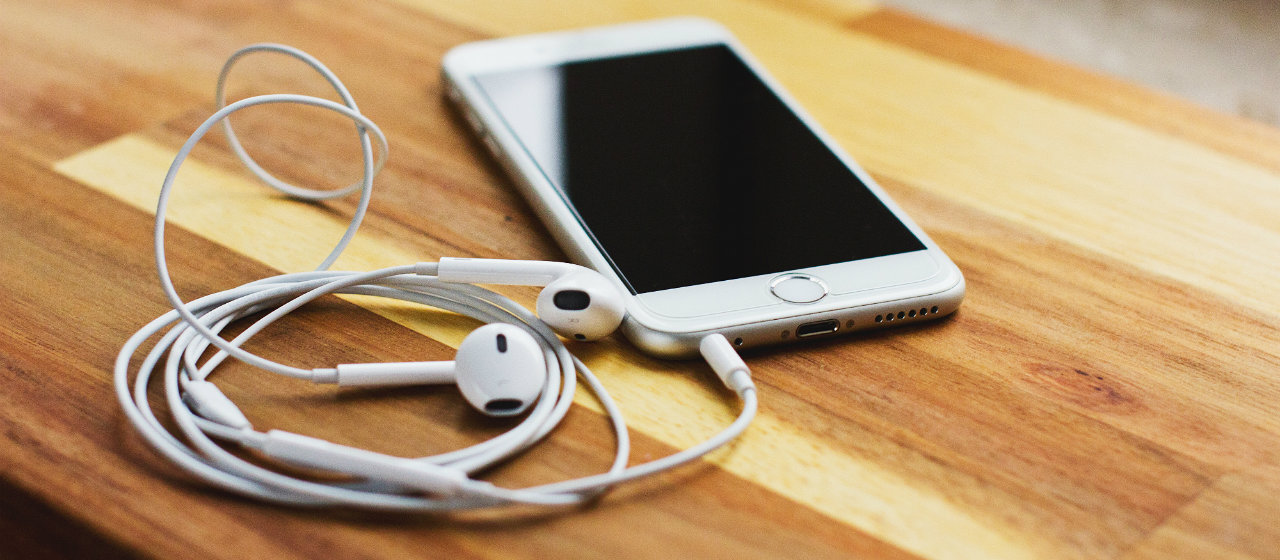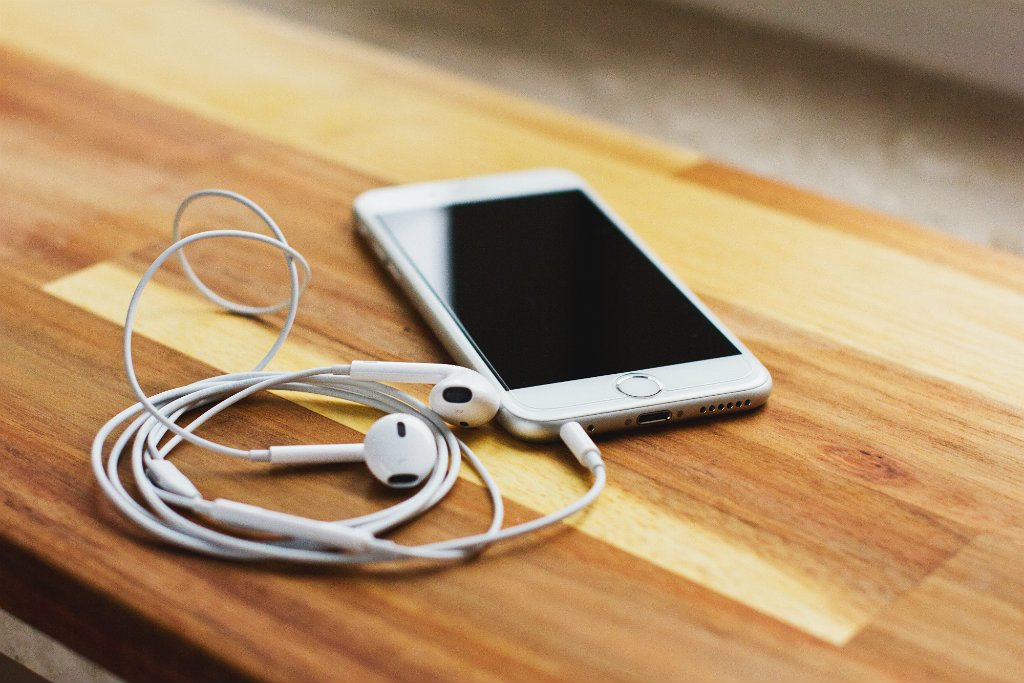 by Sarah Gulseth
by Sarah Gulseth
We live in an on-demand world. Between Amazon Prime, Apple Pay, Netflix, Facebook Live and FaceTime, instant gratification is always just a thumb tap away. Leaving aside for a moment the question of whether that’s ultimately wonderful or terrifying, let’s take a closer look at just one of these on demand items: audio podcasting.
On-demand audio isn’t a new concept. Since the advent of phonographs 100 years ago, prepackaged audio has been distributed right into people’s homes for their listening enjoyment. Fast forward through LP records, 8-track players, cassette tapes and Walkman devices (for the cool kids, right?), CD players, and iPods, and we land where we are now: in the age of smartphones, each with streaming audio capability and enough internal and cloud storage capacity for thousands of hours’ worth of audio files. Given this, it’s not surprising that the number of podcasts — and podcast listeners — has exploded in the last decade.
But what is a podcast?
For those who may still be uninitiated, the word “podcast” is a portmanteau of “iPod” and “broadcast.” Even though relatively few people now use iPods to listen on the go, the name has stuck. Podcasts are audio (or occasionally video) files available on-demand and downloaded directly, often automatically (with subscription), to mobile devices via a podcast capture app. To put it more simply: A podcast is an audio program that you can download, carry with you on a computer or mobile device and listen to whenever and wherever you like.
Podcasting is distinctly unlike radio or streaming web audio. Pressing the “on” button on the radio or the “play” button on a livestream website allows you to hear whatever audio that station is serving at that moment. On the other hand, podcasts give you complete control of your content. Radio listeners join programming that’s in progress, while podcast listeners start at the beginning of the episode and can start and stop at will. Radio program length is determined by the clock, whereas podcasts can be any length imaginable, from less than five minutes to more than five hours. Live radio continues even if a host stumbles over words or a song track happens to malfunction, but podcasts are often carefully produced to be pleasant experiences for the listener and include snippets of background music or sound effects to enhance the story.
Who listens to podcasts?
Podcast technology is exponentially more popular today than when it first emerged in the early 2000s, largely because of the steep surge in smartphone ownership. According to Pew Research, as of January 2017, nearly 77 percent of Americans now own a smartphone, a number that has more than doubled since 2011. As early as 2013, MacWorld reported that Apple had surpassed 1 billion podcast subscriptions of over 250,000 unique podcasts in iTunes alone. In 2017, according to Edison Research and Triton Digital survey data, 24 percent of all Americans aged 12 and over have listened to a podcast in the past month, up from just 9 percent in 2008. All of these numbers mean that millions of Americans, including many LCMS parishioners, now hold thousands of on-demand digital audio files in their pockets.
This may have you wondering …
Should my church start a podcast?
There’s no denying that pastors and churches are particularly well suited to thrive in this new age of on-demand podcasting. While some aspiring podcasters may be clueless about topics and content, pastors more than likely have hours of material already prepared. Think about it. Each week a pastor preaches sermons, conducts Bible studies and perhaps holds a catechism or new member class. Capturing content for online sharing can be as easy as recording a sermon or Bible class on a smartphone, editing out the coughs and dead space, uploading the file to the internet and publishing the podcast on iTunes.
Because listeners can engage with the content of their choice, podcasts are perfect for niche audiences, such as your congregation. On-demand audio can provide a tool for parishioners to tap into when they’re traveling or unable to get to their regular Bible study. It can also allow shut-ins to become better connected to the life of the congregation.
And for the adventurous podcaster, the possibilities go well beyond simply recording the week’s sermon. Simmer sermon and Bible study preparation into short podcasts giving parishioners a hint of the upcoming lectionary, hymn of the day or Bible study topic. Consider recording and sharing memory homework for catechism classes, study programs for marriage counseling, catechesis for new members and other useful audio resources. The list of potential podcast ideas is as big as your imagination.
Podcasting sounds fun. What’s the catch?
Just because podcasting can be an ideal tool for many churches doesn’t mean it’s for everyone. Editing audio files for podcasting is a labor-intensive process, especially for beginners. For busy pastors and volunteers who may already be stretched thin, the time required to produce a quality podcast may represent a sizable and burdensome investment of finite resources.
Then, too, your congregation may not actually be the ideal audience for a podcast. Yes, nearly a quarter of Americans (on average) listen to at least one podcast a month. Three quarters of Americans, however, do not. Determining whether your parish has enough interested and podcast-savvy members to justify the time involved may help you determine whether podcasting is a good idea in your context. Starting a podcast solely as an online outreach tool can be an exercise in frustration. If people in your own congregation aren’t interested, it’s unlikely that you’ll find enough outside listeners to make it worth your while.
The following questions may help you decide if podcasting is right for your church:
- Does a sizeable percentage of your congregation have enough interest and technical savvy to subscribe and listen regularly to a church podcast?
- Do you have skilled volunteers who can invest three or more hours each week producing a podcast? If not, does your pastor have the interest, skill and (most of all) time to take on this task?
- Does your pastor have a voice for radio? (Be honest!) If so, is he willing to have his words recorded and shared in this way?
- Are you ready to make a long-term commitment to producing a regular podcast? It can take time to fine-tune your approach and build a base of listeners. Do you have the patience and dedication to keep going in the meantime?
- What is your reason for wanting to start a podcast? Are you intending it to supplement regular worship and Bible study opportunities for members, or to provide a worship substitute for nonmembers?
- How will your podcast ultimately be a benefit to your church?
As intimidating as the vast world of podcasting and emerging technology can be, the ministry and message of the church are uniquely suited to podcasting. Not only can podcasts share the saving message of Jesus Christ in an on-demand society, but they also have the potential to place powerful learning tools directly in the pockets of congregants. What a blessing that digital audio technology is allowing the Word of God to be so freely accessed and shared!
Sarah Gulseth is a producer and web content specialist for KFUO Radio. She is also co-host (with Andy Bates) of KFUO’s new morning talk show The Coffee Hour, which is (you guessed it!) also available as a podcast.
[box type=”note” border=”full” icon=”none”] [icon name=”check-square-o” class=””] Subscribe to the Lutheran Witness. Print and digital subscriptions are available through Concordia Publishing House. [icon name=”caret-right” class=””] Subscribe Now [/box]





